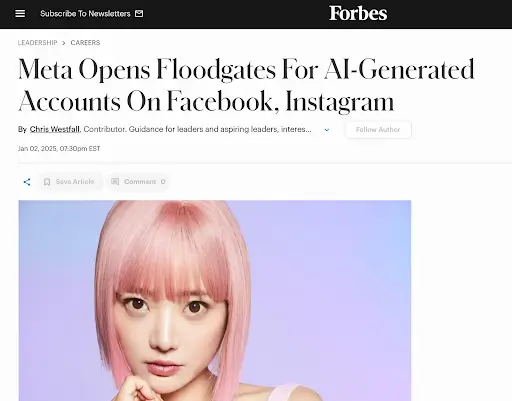
AI-generated social media accounts are rapidly transforming the way we engage online. Platforms like Facebook and Instagram are flooded with AI-generated influencers, chatbots, and avatars, blurring the line between human and artificial interaction. As companies race to develop AI-driven tools, concerns arise over misinformation, digital identity fraud, and the authenticity of social media engagement.
AI and Social Media: A Growing Trend
Social media is evolving rapidly. Meta now allows users to create hundreds of thousands of AI-generated characters through its Meta AI Studio tool, though most remain private. Meanwhile, TikTok has introduced Symphony, a suite of AI tools designed for advertising.
Users can now generate videos featuring AI avatars, similar to services offered by Arcads.ai. This platform enables users to transform a simple script into a full-fledged ad campaign for a fee. Interestingly, these AI-generated personas closely resemble human influencers. While the videos may appear simple, they often feature sophisticated editing, dynamic transitions, and eye-catching visuals that capture attention.
Is AI Content Safe? Challenges and Risks
Meta has implemented rules requiring clear labeling of AI-generated content. However, concerns persist. Deepfakes, fake chatbots, and misinformation could significantly influence public perception.
Some cases even highlight more serious consequences. One lawsuit, for instance, claims that a 14-year-old boy’s suicide was linked to generative AI. The rise of fake identities and AI accounts could lead to manipulation, emotional distress, and the spread of harmful information.
According to eMarketer.com, an overabundance of AI bots on platforms like Facebook and Instagram could drive real users away. More authentic content platforms may become the preferred choice for those seeking genuine human interaction.
Are We Approaching the Dead Internet Theory?
The “Dead Internet Theory” suggests that the vast majority of online content is now AI-generated. This means that not only posts but also user interactions may be entirely simulated by artificial intelligence.
Social networks are already saturated with bots and automated accounts. AI-generated content is becoming so realistic that distinguishing between human and machine-created posts is increasingly difficult. In response, Elon Musk recently introduced a small fee for X (formerly Twitter) users to combat the overwhelming influx of bots.
Disinformation campaigns have become a common phenomenon in recent years. This theory serves as a reminder to approach online content with skepticism. As Yogi Berra famously said:
“In theory, practice and theory are the same. In practice, they are not.”
AI Influencers and the Future of Social Media
Artificial intelligence is radically transforming how we perceive engagement, influence, communication, and branding on social media. Meta sees huge potential in AI, and its new tools could reshape the future of online interactions.
The digital ecosystem is evolving faster than ever before. From AI influencers to automated chatbots in marketing, the internet is entering a new era.
Just as the printing press revolutionized information distribution in the 15th century, AI may redefine how we experience reality online. The real question is: Will people seek out authentic content, or will they accept a world where most online interactions are AI-generated?
Whatever the answer may be, one thing is certain—we are all part of this grand experiment.
Enjoyed this article? Explore more of our latest insights and stay ahead of the trends – check out our other blogs!
Source: Forbes
January 2024


